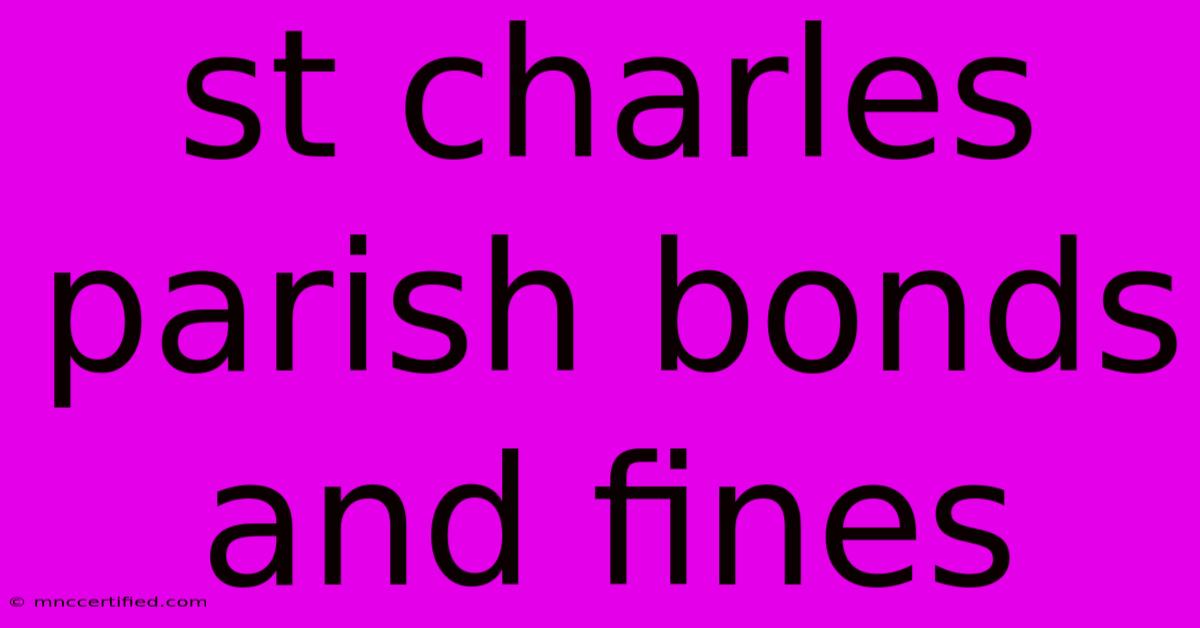St Charles Parish Bonds And Fines

Table of Contents
St. Charles Parish Bonds and Fines: A Comprehensive Guide
Understanding the intricacies of bonds and fines in St. Charles Parish, Louisiana, can be daunting. This comprehensive guide aims to clarify the process, outlining what to expect if you face charges and offering guidance on navigating the legal system. We'll cover everything from understanding the different types of bonds to addressing outstanding fines.
Understanding Bonds in St. Charles Parish
In St. Charles Parish, as in most jurisdictions, bonds are a financial guarantee ensuring your appearance in court. They allow for release from custody pending trial. Several types of bonds exist:
Types of Bonds:
- Cash Bond: This involves paying the full bond amount directly to the court. Upon successful completion of the legal proceedings, the money is refunded.
- Surety Bond: This requires using a bondsman who posts a percentage of the bond amount on your behalf. You pay a fee to the bondsman, typically a percentage of the bond amount. Failure to appear in court results in forfeiting the bond.
- Property Bond: Using real estate as collateral secures your release. The equity in the property must exceed the bond amount.
- Personal Recognizance (PR) Bond: This is a release without monetary payment, based on your promise to appear in court. It's often granted for minor offenses and individuals with strong local ties.
Finding a Bondsman: If you need a surety bond, research reputable bondsmen in St. Charles Parish. Verify their licensing and reputation before engaging their services. Always clarify all fees and conditions upfront.
Missing Court Dates: Failing to appear in court after posting bond has serious consequences, including the forfeiture of your bond and the issuance of a warrant for your arrest. Furthermore, additional charges could be filed.
Navigating Fines in St. Charles Parish
Fines are monetary penalties imposed for violating local ordinances or state laws. The amount varies based on the severity of the offense. Understanding the process of paying fines and addressing unpaid fines is crucial.
Paying Your Fines:
St. Charles Parish likely offers several methods for paying fines:
- Online Payment: Many courts now allow online payments through their websites. This provides convenience and often allows for tracking payments.
- In-Person Payment: Payment can often be made in person at the designated court location.
- Mail Payment: Checks or money orders can be mailed to the specified court address. Always include case information for proper processing.
Understanding Payment Plans: If you’re facing financial hardship, inquire about payment plans. The court may offer options to pay your fines in installments, preventing further penalties. It's essential to contact the court before your due date to discuss payment arrangements.
Dealing with Unpaid Fines:
Failing to pay fines on time can lead to significant repercussions:
- Late Fees: Expect to incur additional charges for late payments.
- License Suspension: Unpaid fines can result in the suspension of your driver's license or other professional licenses.
- Wage Garnishment: In some cases, the court may garnish your wages to recover the outstanding amount.
- Arrest Warrant: Failure to address outstanding fines may lead to an arrest warrant being issued.
Contacting the Court: If you are facing difficulties paying your fines, contact the St. Charles Parish court immediately. Proactive communication is key to avoiding more serious consequences.
Resources and Further Information:
For the most accurate and up-to-date information regarding bonds and fines in St. Charles Parish, always refer to the official website of the St. Charles Parish Clerk of Court. This is your primary source for details specific to your case and current procedures. You can also contact the court directly via phone or in person.
Remember, seeking legal counsel from a qualified attorney is recommended if you're facing serious charges or are uncertain about your legal obligations.
Disclaimer: This article provides general information and should not be considered legal advice. Always consult with legal professionals for advice specific to your situation.

Thank you for visiting our website wich cover about St Charles Parish Bonds And Fines. We hope the information provided has been useful to you. Feel free to contact us if you have any questions or need further assistance. See you next time and dont miss to bookmark.
Featured Posts
-
Axia Futures The Prop Trading Code
Nov 17, 2024
-
Fontana Rattled By 3 4 Earthquake
Nov 17, 2024
-
Uk Weather Warning Snow And Ice Forecast
Nov 17, 2024
-
Consumer Goods Trading Philippines
Nov 17, 2024
-
Five Star Qb Recruiting Battle Heats Up
Nov 17, 2024